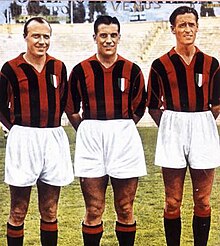|
Gunnar Gren
Johan Gunnar Gren (pronounced [ˈɡɵ̌nːar ˈɡreːn]; 31 October 1920 – 10 November 1991)[1] was a Swedish professional football player and coach. He is best remembered for playing for IFK Göteborg and AC Milan. A creative forward, known for his technical skill, vision, tactical intelligence, and passing ability as a playmaker, he was part of the famous "Gre-No-Li" trio of forwards at Milan and the Sweden national team. He was also capable of playing as an attacking midfielder, as an offensive–minded central midfielder, known as the mezzala role in Italian football jargon, or even as a striker.[2][3] A full international between 1940 and 1958, he won 57 caps and scored 32 goals for the Sweden men's national team. He was a part of the Sweden team that won gold at the 1948 Summer Olympics, as well as the team that finished second at the 1958 FIFA World Cup. In 1946, he was awarded Guldbollen as Sweden's best footballer of the year. Gren is considered to be one of Sweden's greatest and most prolific football players;[4] a statue has been erected in his honor outside Gamla Ullevi stadium. Early yearsGren was born on 31 October 1920 to parents Johan Olsson and Gerda Maria Olsson. Gren, a son of a carpenter, grew up in Majorna, Gothenburg.[5] From a young age, Gren excelled in football. On 7 October 1934, Gothenburg Football Association President Carl 'Ceve' Linde held a juggling contest. He won his first sporting prize – a bronze plaque. Göteborgs Sport Bladet wrote about 13-year-old Gren's skills and how he outshone some of the big boys in the national league. The then-13-year-old Gren played for Strix.[5] During his youth, he played for Lindholmens and GAIK, before playing for Gårda. Club careerGårdaIn 1937, Gren started playing for Gårda BK. He made his Allsvenskan debut on 1 May 1938 against Malmö FF, which resulted in a scoreless draw. During his time there, he played a total of 54 matches, scoring 16 goals.[6] IFK GöteborgIn 1941, he was recruited by IFK Gothenburg. During his time in the club, Gren won one national championships in the 1941/42 season and was top scorer in 1947. He won the first ever Guldbollen in 1946.[7] His first league match for IFK was in August 1941, when Gothenburg played against Gårda, winning 6–1 with Gren scoring the first goal.[8] His last league game for Gothenburg was on 6 June 1949 versus Norrköping at Gamla Ullevi in which Gothenburg lost 1–0.[9] He had played 164 matches for Gothenburg and scored 78 goals. AC MilanOn 11 September 1949, he debuted for A.C. Milan against Sampdoria, with Milan winning 3–1. During his time with Milan, he became the 'Gre' part of the famous Gre-No-Li trio with his Swedish teammates Gunnar Nordahl ('No') and Nils Liedholm ('Li').[10] He also earned the nickname the "Il Professore" which is Italian for "the professor".[11] While at A.C. Milan, he won the league title for the 1950–51 season. He made 133 appearances in Serie A and scored 38 goals.[12] Gren also managed Milan in 1952, before moving to Fiorentina. Later careerIn 1953, Gren moved to Fiorentina, where he made 55 appearances and scored five goals. Then in 1955, Gren moved to Genoa where he made 29 appearances and two goals.[12] Tired of Italy, Gren decided to move back to Sweden. In 1956, Gren returned to Gothenburg, where he joined Örgryte as both player and manager. Gren left in 1959 and played for GAIS in 1963.[13] International career Gren made his debut for Sweden on 29 August 1940 in the team's 3–2 win over Finland. During the next decade he played 40 matches for the national team, ending in 1949 with 3–1 against Ireland in a World Cup qualifier and 2–2 in a friendly against Hungary. During this era Gren was part of the team that won the gold medal in the 1948 Olympics in London, scoring twice against Yugoslavia in the final on Wembley.[1] As a professional, Gren was suspended from the Sweden men's national team. However, the World Cup of 1958 would be in play on home soil and the Sweden national team seemed too weak for the competition, the Swedish Football Association changed this rule, and Gren, having now ended his professional career and playing in the Swedish Division 2, was again eligible. Gren went on to be the second oldest player of this World Cup, 37 years old, and played an important role in the silver medal-winning Swedish team. He played five matches during the World Cup and scored one goal, 2–1 against West Germany in the semi-final. He was also named on the 1958 World Cup All-Star Team. Gren's last cap came on 26 October 1958 against Denmark in a 4–4 draw. At the time, he was 37 years, 360 days old. In all, Gren made 57 appearances for the national team, scoring 32 goals. Managerial careerWhilst at A.C. Milan, Gren managed the team in 1952. Also, Gren managed both Örgryte and GAIS as player-manager. After retiring as a player, Gren managed several teams. Gren became the technical director for Juventus for a brief period in 1961. Gren then managed GAIS,[14] Värnamo, Redbergslids, Skogens, Oddevold and Fässbergs. RetirementGren retired from football in the 1970s. He died ten days after his 71st birthday, and is buried in Västra Kyrkogården (Western Cemetery), Gothenburg, Västra Götaland, Sweden. Career statisticsClub
International
Honours
Individual
References
External linksWikimedia Commons has media related to Gunnar Gren.
|
|||||||||||||||||||||||||||||||||||||||||||||||||||||||||||||||||||||||||||||||||||||||||||||||||||||||||||||||||||||||||||||||||||||||||||||||||||||||||||||||||||||||||||||||||||||||||||||||||||||||||||||||||||||||||||||||||||||||||||||||||||||||||||||||||||||||||||||||||||||||||||||||||||||||||||||||||||||||||||||||||||||||||||||||||||||||||||||||||||||||||||||||||||||||||||||||||||||||||||||||||||||||||||||||||||||||||||||||||||||||||||||||||||||||||||||||||||||||||||||||||||||||||||||||||||||||||||||||||||||||||||||||||||||||||||||||||||||||||||||||||||||||||||||||||||||||||||||||||||||||||||||||||||||||||||||||||||||||||||||||||||||||||||||||||||||||||||||||||||||||||||||||||||||||||||||||||||||||||||||||||||||||||||||||||||||||||||||||||||||||||||||||||||||||||||||||||||||||||||||||||||||||||||||||||||||||||||||||||||||||||||||||||||||||||||||||||||
